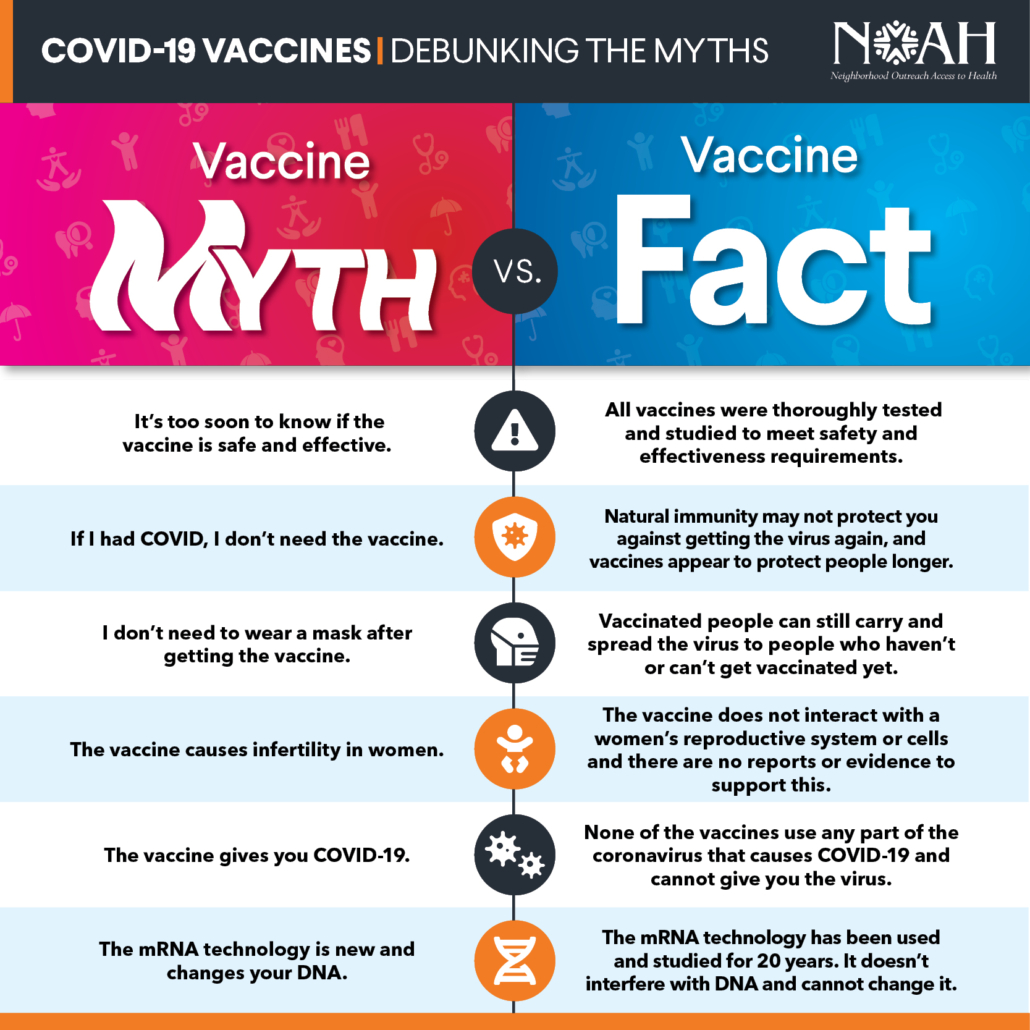Alicia Ottmann, MMS, PA-C | Director of Advanced Practice
COVID-19 has been part of our lives for almost a year. With the welcome news of a vaccine, there is a lot of information to understand. That’s why NOAH’s expert, Alicia Ottmann, NOAH’s Director of Advanced Practice, answered some of the most popular COVID-19 vaccine questions.
When will the vaccine be available?
There are a few different versions of the COVID-19 vaccine, all in different phases of development or use. Currently (as of Dec. 22), the Pfizer and the Moderna vaccines have both received emergency use authorization by the U.S. Food and Drug Administration and are starting to be distributed and administered to people who need it.
The federal and state governments have categorized groups of individuals who will receive the vaccine first, these people are the highest risk for contracting the virus or developing complications as a result of infection. Examples of those who will be vaccinated first include healthcare providers and long-term care facility residents.
The next group will include people who are at increased risk of getting severely ill or who are more likely to be hospitalized if they contract COVID-19, this includes the elderly and essential workers such as bus drivers, teachers and grocery store workers. After that, the people that the CDC identifies as needing to take extra precautions – those who are undergoing cancer treatment, living with a chronic disease, etc. – will likely be next. The priority categories are similar from state to state, but subcategories and the rate at which they move from phase to phase may have some differences depending on where people live.
Vaccinating millions of people can take time, so for those individuals in the general population, who do not get vaccinated as part of the first priority groups, vaccines will likely not become available until spring of 2021 or beyond.
Can I get vaccinated at NOAH?
NOAH doesn’t have the vaccine yet. The vaccines have arrived in Arizona but are not available for us to order just yet. We are planning on offering multiple easy ways to get vaccinated, which might include drive-up appointments or drive-through events so patients can avoid coming into the clinic.
Keep checking the NOAH COVID page for updates about the vaccine, testing and other COVID news in Maricopa County.
How will I know when the vaccine is available for me?
If you are in one of the categories that will get vaccinated first – healthcare worker, frontline employee – then you will be contacted by whatever entity has been tasked with serving your employer. For example, healthcare workers, teachers, EMS, etc., all get assigned to geographic groups. The organization in charge of that group will be responsible for scheduling all of those who are interested in getting vaccinated.
People who are high-risk or who qualify because of their age will likely be assigned to one of these geographic groups, or will be provided with vaccination sites that they can go to (the details are still being worked out).
How do register for the vaccine?
If you qualify to get the vaccine because of your job, your employer will send your information to the responsible organization and they will contact you when it is time to schedule. The health department is working on the process for the remainder of the priority groups (1b, 1c etc.).
Different zip codes have different groups, or pods, that manage that information. For example, if you work in healthcare in Mesa, you will have a specific site where you will get vaccinated.
After the highest risk individuals are vaccinated, the general public will likely be able to get the shot at primary care offices or specific pharmacies.
Will we have to take it every year like the flu shot?
At this time we are unsure. We have recently seen some changes in the virus, similar to what happens with different strains of the flu year to year. At this time the vaccine is still effective, but scientists are learning more about COVID-19 all the time.
Is the vaccine going to work?
The COVID-19 vaccines currently available do not use a live, weakened virus, unlike many of the other vaccines we are familiar with. Both vaccines currently available are about 95% effective. This means that after someone gets both doses, they will develop an immune response that will fight off the virus the majority of the time.
However, we need around 70-80% of the population vaccinated to reach herd immunity which will allow us to recover from the pandemic and the strain that it has placed on our systems. Herd immunity helps to protect our entire community, especially those who cannot get vaccinated. It’s also worth noting that right now, the vaccines aren’t authorized for children.
Will it be effective if children can’t get the vaccine?
The reason we are not able to vaccine children under 16 years old is because not enough studies have looked at the safety and effectiveness in children. Those studies are currently underway, and it is a rigorous process. Since we know it is safe for adults, we have now started looking at children, pregnant women and other populations with the hope of expanding the number of people who are candidates. It will just take more time for it to be authorized for widespread use.
What will the vaccine cost? What if I don’t have insurance?
There is no cost for the vaccine. If you have insurance, it will be billed to your insurance company, but you will not be responsible for any portion. If you don’t have insurance, there will be no cost to you as it will be covered by federal funds.
What if I get one dose and miss my appointment to get the second?
Unfortunately, if you miss the window for taking the second dose, you may have to start the vaccine process over. The effectiveness of the vaccine hinges on getting it at the right time, the studies have not looked at huge differences in timing and thus we are unsure about whether you would need to start over, or if you could get the second dose outside of the recommended window of time.
Also, it is important for you to get your second dose from the same vaccine manufacturer. If the first dose is the Pfizer COVID vaccine, then the second dose also has to be Pfizer. No switching or mixing allowed.
Will this vaccine alter my DNA because it uses mRNA?
No, it won’t alter your DNA as it never enters the nucleus of the cell. The science used for the mRNA COVID vaccines has been used safely for other medical purposes for over a decade, but COVID-19 is the first time the science has been used in widely distributed vaccines. The way it works is, instead of giving our bodies a weakened virus or portion of a pathogen to trigger our immune system to make antibodies like typical vaccines, the mRNA process is giving our body the “recipe” to make the proteins which trigger an immune response (antibodies).
And, the good news is that the process to manufacture the vaccines is faster and looks to be highly effective, maybe more effective than traditional vaccine methods!
Check back with NOAH for more updates about COVID testing and vaccines and your other healthcare needs.




